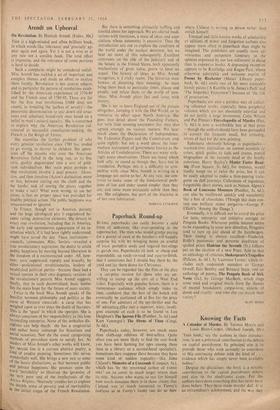Arendt on Upheaval
On Revolution. By Hannah Arendt. (Faber, 30s.)
THIS is a high-minded and often brilliant book, in which words like 'relevance' and 'precisely' ap- pear again and again. Yet it is not a wise or at any rate not a sensible book. The total effect is imprecise, and the relevance of some portions is hard to decide.
Such a complaint might be-considered unfair. Miss Arendt has tackled a set of important and complex themes and made an effort to analyse them freshly. Revolution is her central subject, and in particular the pattern of revolutions estab- lished by the American experiences of 1776-89 and the French ones of 1789-93. These are for her the first true revolutions (1688 does not count), in revealing the 'pathos of .novelty'—the passionate determination to tear down old struc- tures and substitute brand-ne'w ones based on a belief in man's natural equality. She is concerned to explain why the American Revolution cul- minated in successful constitution-making, the French in the Reign of Terror.
She examines the further problem of why every genuine revolution since 1789 has tended to go wrong, to devour its children. She specu- lates oft the reasons why even the American Revolution failed in the long run, as its fine civic quality degenerated into a sort of gold- rush individualism. Her main point perhaps is that revolutions involve a dual process: !Thera- don, and then freedom (Acton's distinction, more or less, between cutting out the cloth and the far harder task of sewing the pieces together to make a suit). What went wrong, to use her terms, is that no proper space was provided for healthy political action. The public happiness was misconstrued or ignored.
In France, though not in America, poverty and the huge ideological pity it engendered be- came ruling, destructive elements. She detects in every true revolution, including•that in America, the early and spontaneous appearance of an in- stitution which, if it had been rightly understood, might have saved the day. These institutions— councils, communes, Rate, Soviets--revealed a true revolutionary aspiration, the desire to attain public happiness by moving beyond liberation to the freedom of a reconstructed order. All, how- ever, were suppressed, rapidly and brutally, by elites—professional revolutionaries, leaders of established political parties—because these had a vested interest in their own dogmatic versions of the revolutionary pattern. Miss Arendt suggests, finally, that in such decentralised, basic bodies lies the main hope for the future of mass society.
Twice in the book Miss Arendt speaks of the hostility between philosophy and politics as the curse of Western statecraft: a curse that has Weighed upon us ever since the death of Socrates. This is the 'space' in which she operates. She is always conscious of her responsibility in this lone reconciling enterprise. None of the orthodox dis- ciplines can help much: she has a magisterial and rather bossy contempt for historians and social scientists. Nor do the usual categorising methods of procedure seem to satisfy her. As readers of Miss Arendt's other works will know, her special line is a curious abstract poetry, a kind of erudite punning. Sometimes this serves Wonderfully well. She brings a new zest to some of the hoary distinctions, as that between public and private happiness: She pounces upon the Word 'invisibility' to illustrate the ignominy of the very poor and of the intellectuals of the .411ciell Regime. 'Neeessity' enables her to explore the double sense of poverty and of inevitability in the initial stages of the French Revolution. But there is something ultimately baffling and unsolid about her approach. We are offered medi- tations with footnotes, a mass of ideas and asso- ciations whose autonomy is excessive. Thus the introduction sets out to explore the condition of the world under the nuclear deterrent, but we hear no more of this subsequently. Excellent comments on the role of the judiciary and of the Senate in the United States, both apparently mechanisms of great vatue, prove to have no sequel. The history of ideas, as Miss Arendt recognises, is a tricky realm. The historian must beware of distorting their meaning: he must bring them back to particular times, places and people, and relate them to the world of non- ideas. Miss Arendt plays fast and loose with history.
She is apt to leave England out of the picture altogether, lumping it with the Old World, or to minimise its effect upon North America. She goes into detail about the Founding Fathers, but with little seeming awareness that they disc agreed strongly on various matters. We hear much about the Declaration of Independence, the Federalist Papers and the Constitution, and quite rightly; but not a word about the inter- mediate instrument of government known as the Articles of Confederation. There are many strik- ingly acute observations. There are many which look silly, or sound as though they have lost in translation. Perhaps this is a difficulty to sym- pathise with, since Miss Arendt is writing in a .language not native to her. At any rate, she con- trives to make some of the fundamental prob- lems of law and order sound simpler than they are, and some more intricately subtle than they are. She enlightens, but part of the blackout is of her own fabrication.
MARCUS CUNLIFFE






































 Previous page
Previous page